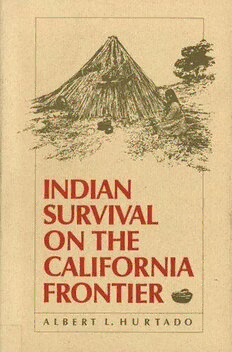
Indian Survival on the California Frontier PDF
270 Pages·2018·8.539 MB·English
Most books are stored in the elastic cloud where traffic is expensive. For this reason, we have a limit on daily download.
Preview Indian Survival on the California Frontier
Description:
During the middle decades of the nineteenth century, when vast numbers of whites poured into California, the native Indian population was decimated through disease, starvation, homicide, and a declining birth rate. In this prize-winning book, Albert L. Hurtado focuses on the Indians who survived this harrowing time. Hurtado considers the ways in which native life and culture persisted, how the survivors integrated their lives with white society, and how the now-dominant whites related to the Indians living and working with them. “Anyone interested in California Indians should read this book.”—William Bright, Los Angeles Times Book Review “Hurtado takes a fresh look at the role Native Americans played in shaping frontier California. The Indians emerge from this study not merely as victims of white rapaciousness but as an active historical influence, serving as both a resistance force to white incursion and as prime shapers of the agricultural work force.”—Booklist “A wide-ranging and imaginative discussion of significant issues that are at the very center of scholarship on western settlement during the nineteenth century.”—Roger Nichols, University of Arizona Winner of the 1989 Ray Allen Billington Prize awarded by the Organization of American Historians for the best book in American frontier history.
See more
The list of books you might like
Most books are stored in the elastic cloud where traffic is expensive. For this reason, we have a limit on daily download.
